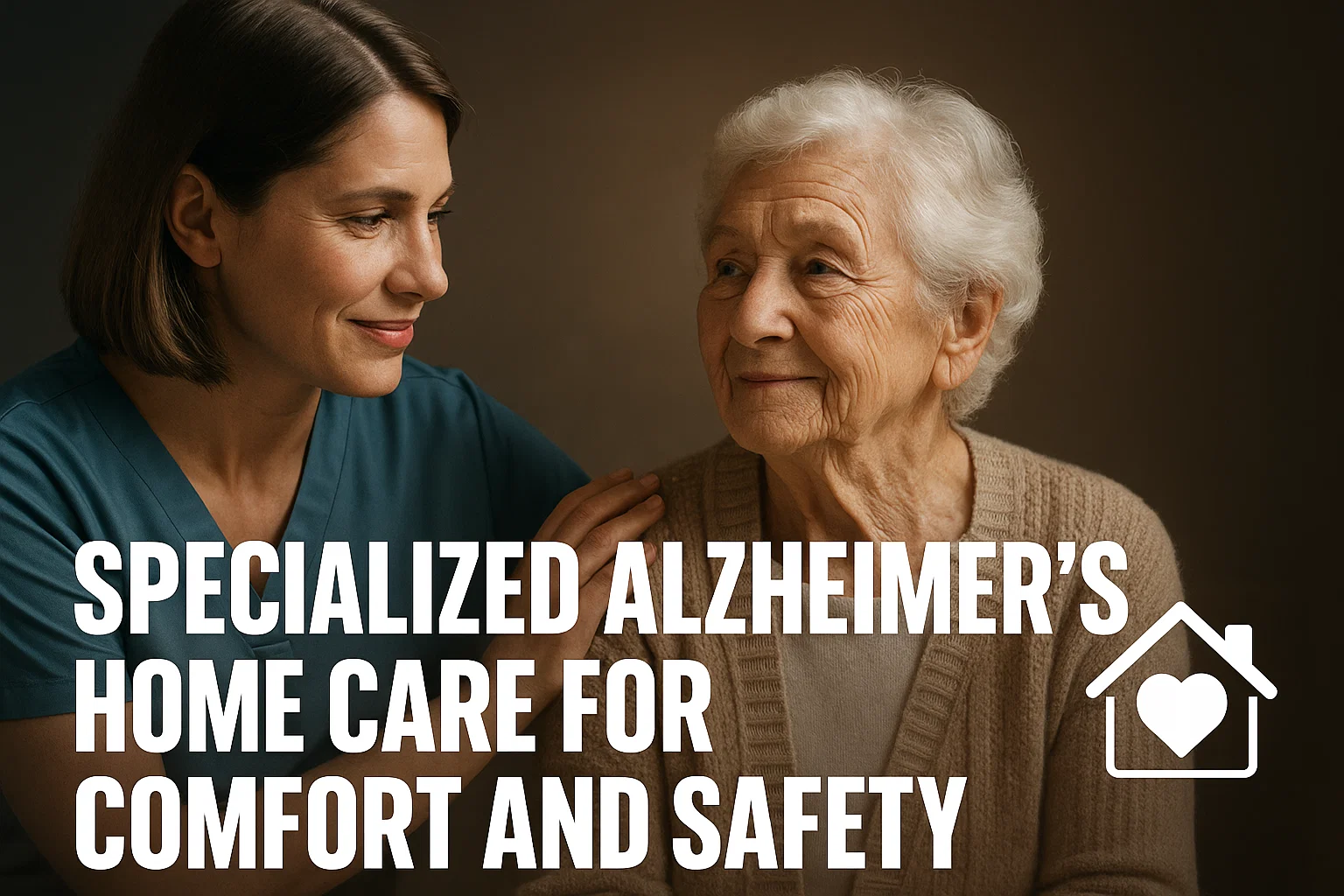Being a care provider to an Alzheimer patient is sometimes overwhelming. The families desire the most efficient care with the guarantee of comfort, safety, and dignity. This is where the Alzheimer specialized home care comes in. It offers professional services with the comfort of home environment so that patients get the balance they require.
Alzheimer-based home care is not just another type of care that is aimed at meeting daily needs but rather at the development of the atmosphere in which the seniors will feel safe, respected and understood. Individualized schedules to security checks, specialized care can assist families to have peace of mind and their loved one to have independence.
Why Specialized Alzheimer’s Home Care Matters
The specialized Alzheimer care is not just a simple help, it is a custom-made help to the special issues that memory loss poses. The patients of Alzheimer might be confused, have mood swings, or struggle to cope with their daily routine. These issues can be addressed in a soft and efficient way with proper approach.
Home care is particularly effective since seniors are able to remain in an environment that they are familiar with. Known rooms, favorite chairs or favorite photos are comforting and they diminish anxiety. Such professional caregivers receiving training in Alzheimer caregiver support know how to react in a patient, emphatic and consistent manner.
What Families Can Expect from Alzheimer’s Home Care
The families that opt to have Alzheimer’s home care will get more than just assistance in doing chores or taking meals. It is about the establishment of a strategy that will touch on both the safety and emotional health. Specialized care usually entails the following:
- In-home care of elderly patients to help them with daily activities like bathing, dressing, or feeding.
- Home based memory care strategies involving mental stimulation by music, games or discussions.
- AD patients Safety measures to prevent wandering or falls, or home accidents.
- Dementia Behavioral therapy can be used to treat agitation, confusion or restlessness calmly.
- Home-based cognitive support assisting in the maintenance of routine and reassurance in times of memory lapses.
These services do not fit in a one-size-fits-all. The plans of care are customized according to the needs, lifestyle and health status of the senior.
Specialized Alzheimer’s Home Care: Comfort and Safety in Action
The Alzheimer home care is specialty housing that is constructed on two fundamental principles, comfort and safety. They are both crucial towards assisting the elderly as they age with dignity and also to reduce the pressure on the families. We shall see how this is the case.
Creating Comfort Through Familiarity
Patients with alzheimer disease feel most comfortable when being at home. The space that is familiar minimizes disorientation and offers emotional comfort. For example:
- Personalized routines – Eating, activities and rests at the same time every day make the seniors feel secure.
- Familiar surroundings – Having photos of loved ones, favorite blankets, or old and treasured furniture around is a comfort.
- Companionship – Caregivers who have quality time together, talking, listening, or carrying out hobbies curb loneliness.
Patience is also a source of comfort. The professional caregivers understand that this is the day to be tougher than the rest. They remain calm and accommodative to the seniors, and make them feel respected and valued.
Safety Monitoring for Alzheimer’s Patients
Safety is a top priority. Wandering, forgetfulness or balance problems can be brought about by Alzheimer and these factors could expose the seniors to risks. Home care which involves specialization brings practical solutions, which include:
- Wandering prevention – The elderly have locks or alarms installed in secure spots to ensure that they do not go out without anyone noticing them.
- Fall prevention – Loose rugs should be removed, and the lighting should be improved; mobility aids reduce the risk.
- Medication management – Caregivers include medication reminders or support so that the medications are used at the appropriate time.
Safety monitoring will also ease the mind of the families as they will be sure that their loved one is safe.
Alzheimer’s Daily Living Help
The everyday chores can be annoying to an Alzheimer patient. Special treatment aims at dividing those tasks into simple and manageable steps:
- Showering and dressing with decency and respect towards privacy.
- Cooking based on nutrition and tastes.
- Maid service to keep the place clean and comfortable.
It is not aimed at depriving independence, but providing only the necessary amount of support. Even minor achievements such as being able to button a shirt or stir a pot can make a person feel accomplished.
Behavioral Support for Dementia
Alzheimer changes are marked with behavioral changes. The patient can be agitated, confused, or moody. Caregivers are trained to offer reassurance and redirection. For example:
- Listening to slow music to calm down.
- Giving a brisk stroll when one is anxious.
- Delicately steering discussions out of uncomfortable issues.
This form of behavioral support enables the establishment of a serene environment and this favor both families and the patients.
Cognitive Support at Home
Although there is memory loss, several elderly people enjoy activities that arouse recall and happiness. Cognitive support makes the mind alive and active. Examples include:
- Hearing childhood favorites.
- Browning family photo albums.
- Easy puzzles or ability-modified remembering games.
- Promoting sharing of narratives of former experiences.
Such activities do not only help in stimulating memory but also help in enhancing emotional attachment between the elderly and the caregiver.
Benefits of Specialized Alzheimer’s Home Care

When the families opt to have the specialized Alzheimer care at home, life-changing benefits in the daily comfort, safety, and emotional wellbeing of the loved one are experienced. In contrast to general care, this solution will be planned to consider the specifics of Alzheimer’s disease. Loss of memory to behavioral changes, each stage of Alzheimer brings about new needs- and with specialized home care, the needs are addressed with patient, respectful, and dignified attention. The following are some of the most crucial benefits:
Comfort of Home
The fact that it is very familiar is one of the greatest benefits of Alzheimer home care. In case of the elderly who have memory loss, sight, sound, and routine are supportive as they make them less confused and agitated. They can feel comfortable with a favorite chair, photos on the wall, or even a smell of their own kitchen and this cannot be replicated in a care facility.
Personalized Attention
Each person with Alzheimer behaves differently and has his or her habits and routines. Special caregivers are given time to understand such details and adjust care to accommodate these details. As an illustration, a caregiver can take the knowledge that his or her client is soothed when listening to specific music in the evening, or that a regular bedtime schedule will ease nervousness. This time spent with seniors makes them feel appreciated.
Enhanced Safety
The families are always concerned about safety. Alzheimer may predispose the person to accidents like falls, wandering, or leaving the appliances on. Specialized home care entails safety monitoring of the Alzheimer Patients, administering the adjustment of the home environment to ensure there are no risks, and watching the patient. This is the level of support that will assist the seniors to stay at home without putting their lives at risk.
Peace of Mind for Families
It is rewarding and daunting to take care of an Alzheimer individual. Families are usually in a dilemma of whether to keep the patient under full-time or give themselves time to attend to own duties. Having trained caregivers available to the patient means that the family does not have to worry about the patient being left with someone who may not be as competent or kind hearted as they are. This sense of calmness eliminates stress and enhances family bonds.
Improved Emotional Well-Being
The disease of Alzheimer may lead to anxiety, fear or frustration. Behavioral interventions to support dementia are provided to the special caregivers to enable the seniors to cope with these emotions calmly and respectfully. Light redirection, calming activities and routines can be of significant importance in alleviating agitation and establishing a serene atmosphere.
Maintained Independence
It is possible to help a large number of elderly people to engage in daily life despite memory problems under the proper amount of support. In the case of Alzheimer and daily living assistance, the caregiver motivates the elderly to participate in activities that they can safely perform and can manage such as laundry, watering plants, and even making simple food. This assists in keeping one independent and purposeful which is crucial towards emotional well-being.
Tips for Families Supporting Alzheimer’s Patients at Home
The role of families is also enormous in establishing comfort and safety. Here are some practical tips:
- Establish consistent routines – Routine schedules eliminate confusion.
- Simplify choices – Have two types of clothing, rather than a complete wardrobe.
- Keep the home safe – Clean up, tie up loose carpets and enhance lighting.
- Communicate gently – Use short sentences, patience, and positive tone.
- Encourage engagement – Listen to music, go on a walk, or read photos.
- Seek Alzheimer’s caregiver support – Collaborate with therapists to find a balance between care and rest.
These measures are meant to make the families more confident besides enhancing the day-to-day life of the loved one.
FAQs
Yes. They can be able to engage in day to day activities albeit with support and structure as they remain safe.
They implement safety monitoring equipment, redirection measures and routine to minimize risks.
It contains such activities as music, puzzles or storytelling which preoccupies the mind and offers comfort.
Caregivers help in activities such as bathing, dressing and eating without interfering with dignity and autonomy.
Family members offer intimacy, familiarity, and contact, whereas caregivers are in charge of specialized care.
A number of families will choose home care since it incorporates the personal attention along with the comfort of being at home.
Conclusion
The home care of Alzheimer is more than just assistance. It is all about saving face, keeping safe and making sure that there is comfort in every day. Through proper assistance, the elderly will be able to spend time at home, in the comfort of the most preferred things, and the family will experience serenity knowing that their own one is in safe and respected hands.
At the Precious Pearl Home Care, we know the difficulties in Alzheimer and offer caring and specialized services aimed to provide comfort and safety.
In order to learn more, go to Precious Pearl Home Care.






